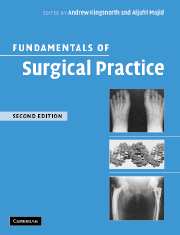Book contents
- Frontmatter
- Contents
- Preface
- Contributors
- 1 Preoperative management
- 2 Principles of anaesthesia
- 3 Postoperative management
- 4 Nutritional support
- 5 Surgical sepsis: prevention and therapy
- 6 Surgical techniques and technology
- 7 Trauma: general principles of management
- 8 Intensive care
- 9 Principles of cancer management
- 10 Ethics, legal aspects and assessment of effectiveness
- 11 Haemopoietic and lymphoreticular systems: anatomy, physiology and pathology
- 12 Upper gastrointestinal surgery
- 13 Lower gastrointestinal surgery
- 14 Hernia management
- 15 Vascular surgery
- 16 Endocrine surgery
- 17 The breast
- 18 Thoracic surgery
- 19 Genitourinary system
- 20 Head and neck
- 21 The central nervous system
- 22 Musculoskeletal system
- 23 Paediatric surgery
- Index
3 - Postoperative management
Published online by Cambridge University Press: 15 December 2009
- Frontmatter
- Contents
- Preface
- Contributors
- 1 Preoperative management
- 2 Principles of anaesthesia
- 3 Postoperative management
- 4 Nutritional support
- 5 Surgical sepsis: prevention and therapy
- 6 Surgical techniques and technology
- 7 Trauma: general principles of management
- 8 Intensive care
- 9 Principles of cancer management
- 10 Ethics, legal aspects and assessment of effectiveness
- 11 Haemopoietic and lymphoreticular systems: anatomy, physiology and pathology
- 12 Upper gastrointestinal surgery
- 13 Lower gastrointestinal surgery
- 14 Hernia management
- 15 Vascular surgery
- 16 Endocrine surgery
- 17 The breast
- 18 Thoracic surgery
- 19 Genitourinary system
- 20 Head and neck
- 21 The central nervous system
- 22 Musculoskeletal system
- 23 Paediatric surgery
- Index
Summary
INTRODUCTION
Outcomes after surgery are influenced by:
preoperative physiological status,
operative severity,
the provision of appropriate care.
Surgeons can minimize the deleterious effects of the surgical insult by careful preoperative planning, meticulous intraoperative technique and by accurate postoperative care.
Preoperative Physiological status
Preoperative co-existing medical problems translate into increased operative risk. The simplest tool to assess patient risk factors is the American Society of Anesthetists (ASA) scale. This is a subjective assessment of the patient's operative risk based on the presence and severity of co-existing medical problems, which are detected by routine history and physical examination.
The Physiological and Operative Severity Score for the enUmeration of Mortality and morbidity (POSSUM) was developed in 1991. POSSUM variables include physiological markers and other factors related to operative severity. These variables have been tested extensively and have resulted in a central database of over 200,000 patients. POSSUM scoring has been used to predict the outcome of patients undergoing a broad range of operations and has been recognized as being the most appropriate available score for assessing risk in surgical patients. However, POSSUM over-predicts mortality for those patients at the low-risk end of the spectrum. The Portsmouth group revised the scoring and the so-called P-POSSUM is now widely used.
Operative severity
Surgery (or trauma from injury) has been shown to result in immune suppression and organ failure is the leading cause of death in surgical patients.
Information
- Type
- Chapter
- Information
- Fundamentals of Surgical Practice , pp. 39 - 49Publisher: Cambridge University PressPrint publication year: 2006
